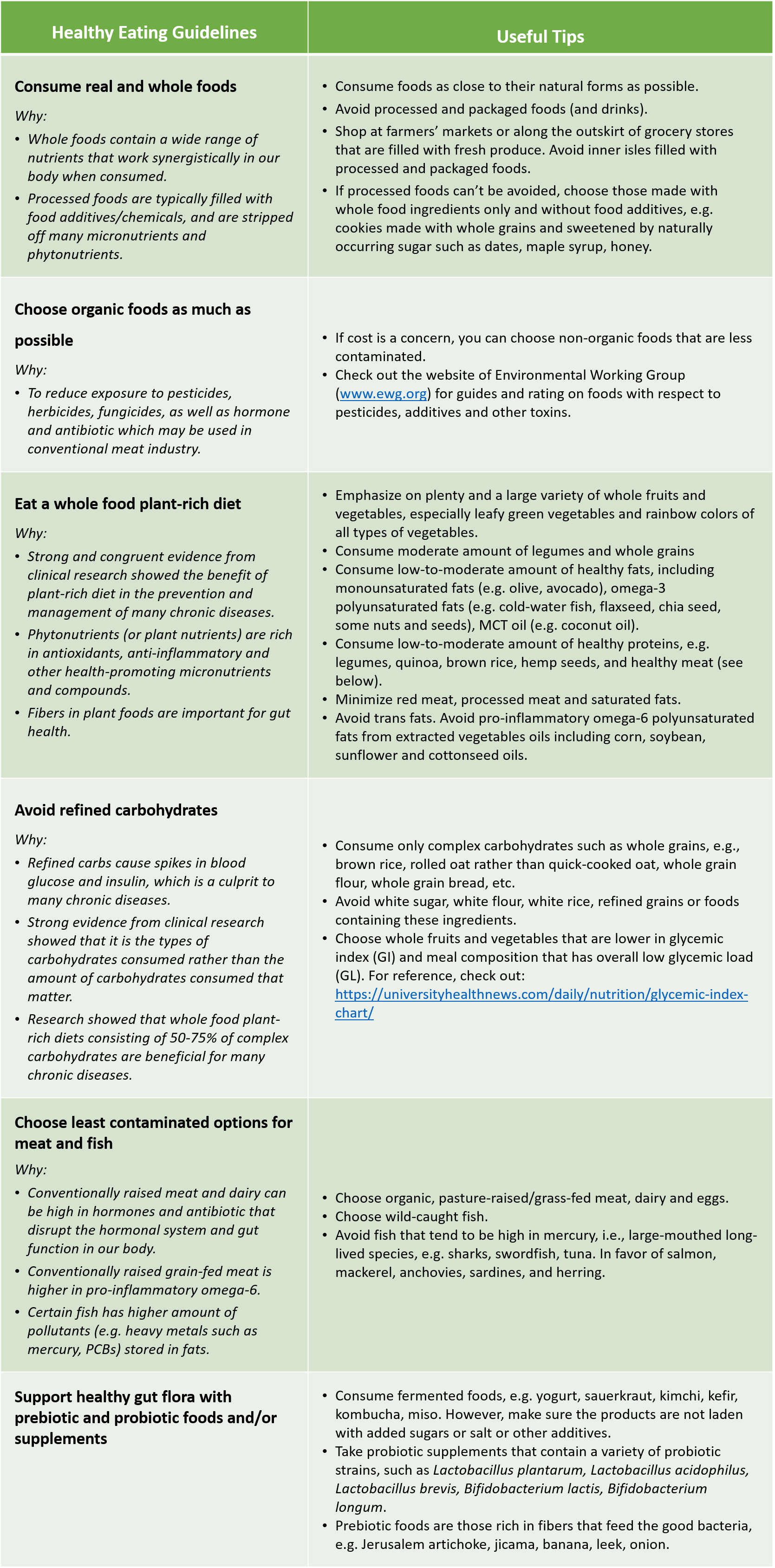You may have heard or read about various diets that claim to be good for health including low carb diet, low fat diet, Paleo diet, ketogenic diet, etc. These various information and health claims can be confusing and sometime contradictory to one another.
Hence, I decided to put together a series of articles on my website related to Diets and Chronic Diseases, ranging from type 2 diabetes, to high blood pressure, heart disease, Alzheimer’s disease and dementia, and cancers.
In these articles, I researched and presented the latest findings from clinical research and peer-reviewed journal publications. You can check out these articles here: www.simplyradiantliving.com/nutrition/.
Across the different types of chronic diseases, there is strong synergy on what the underlying factors contributing to the disease process are.
Interestingly, there is also strong synergy on what a healthy diet looks like to prevent, slow the progression or in some cases reverse these chronic diseases.
Common Underlying Factors Promoting Disease Process
There are several key underlying factors that promote disease process.
Chronic Inflammation and Oxidative Stress
Factors promoting inflammation and oxidative stress:
- Toxins including chemicals and heavy metals from foods and environment.
- Obesity and abdominal fat
- Dysfunction in blood sugar regulation and insulin resistance (IR), resulting in elevated blood glucose and insulin levels. IR also contributes to overweight and obesity.
- Biotoxins from hidden infections (e.g. bacteria, virus, parasites, mold)
- Certain foods (see below)
- Gut dysfunction (see below)
Foods that promote inflammation includes:
- Saturated fats (e.g. meat especially red meat and processed meat).
- Omega-6 polyunsaturated fats (e.g., some refined vegetable oils such as corn, soybean, sunflower and cottonseed oils).
- Advanced glycation end products (AGEs), found in cooked or uncooked meat especially beef, poultry and pork, fish, and aged cheese. High and dry heat cooking increase the levels of AGEs in foods.
Gut Dysfunction
Dysfunction in our digestive system (or gut) can be a major culprit that cascade to many other health issues. (See more details in Why Your Gut Feeling Matters.)
Gut dysfunction not only affects digestion and absorption of the foods we ingest, but can also contribute to chronic inflammation, immune disorders, brain and nervous system disorders, and other metabolic disorders.
Gut dysfunction may include:
- Imbalance of gut flora (i.e., overgrowth of bad bacteria and other microbes, and undergrowth of good bacteria and other microbes), also called dysbiosis.
- Inflammation and degeneration of the intestinal lining.
- Leaky gut.
- Gut infections (e.g. bacteria, virus, parasites)
What Does A Healthy Diet Look like?
The types and quality of foods we eat are more important than merely strict calorie counting or strict restriction on the proportion of macronutrients (carbohydrates, fats, proteins).
The table below summarizes six general guidelines for healthy eating.
For more specific details and background on the clinical research findings, please check out my articles on Diets and Chronic Diseases in www.simplyradiantliving.com/nutrition.

Now, There Are Some Exceptions …
In addition to the above general guidelines, there are some exceptions due to highly individualized health conditions of each person.
Food Sensitivity/Intolerance
A person with compromised gut function, hyper-active immune response or autoimmune disorders may react to certain foods.
Read more about the relationship between leaky gut, food sensitivity/intolerance and autoimmune disorders in Why Your Gut Feeling Matters.
A person with food sensitivity/intolerance, or autoimmune disorders may be triggered by certain foods, such as:
- Wheat (including spelt, Einkorn and farro) and other gluten grains (e.g. barley, rye)
- Other non-gluten grains
- Nightshade vegetables, e.g. tomatoes, eggplants, potatoes, peppers, etc.
- Other common food allergens such as dairy, eggs, fish, crustacean shellfish, tree nuts, peanuts, and soy.
Food sensitivity/intolerance is highly individualized and can manifest as severe symptoms such as allergies, environmental sensitivity and Celiac disease, but can also has more subtle symptoms such as fatigue, headache, joint/muscle aches, and skin breakouts.
Therefore, it is important to find out if we are sensitive/reactive to certain foods, through an elimination or cleansing diet or lab test for food sensitivity.
Removing sensitive/reactive foods can help the gut to heal, calm the over-active immune response and inflammation, and subsequently can help to resolve the food sensitivity/intolerance issues and immune dysfunction.
Digestive Intolerance
Because of lack of certain digestive enzymes and gut dysbiosis (e.g. lack of friendly bacteria to digest certain carbohydrates called FODMAPs*, or small intestine bacteria overgrowth (SIBO)), some people may have digestive intolerance to certain foods such as lactose and casein in milk products, FODMAPs and prebiotic foods.
Digestive intolerance can manifest as bloating, belching, flatulence, diarrhea, loose stool, constipation, indigestion, etc.
As the gut heals, food intolerance will typically improve.
* FODMAPs stands for “Fermentable Oligo-, Di-, Mono-saccharides and Polyols” which are basically short-chain carbohydrates. For reference on the list of low or high FODMAPs foods, check out https://www.monashfodmap.com/about-fodmap-and-ibs/high-and-low-fodmap-foods/.
Related Articles
Diets and Chronic Disease (Part 1: Type 2 Diabetes)
Diets and Chronic Disease (Part 2: High Blood Pressure)
Diets and Chronic Disease (Part 3: Heart Disease)
Diets and Chronic Disease (Part 4: Alzheimer’s Disease)
Diets and Chronic Disease (Part 5: Cancer)

